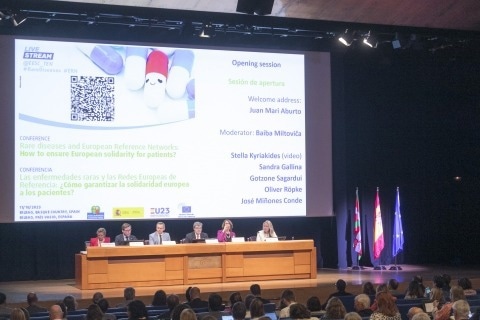At its conference in Bilbao, the European Economic and Social Committee (EESC) urged the European Union to launch a European action plan stepping up cooperation between national health systems. The main goal: to provide better diagnoses, treatment and care to patients with rare diseases.

Image Credit: European Economic and Social Committee (EESC)
A European strategy to give people with rare diseases the care they need in the EU Member State where the best treatment is available.
This was the EESC's plea to the European Union and its Member States at the conference held in Bilbao on 10-11 October 2023.
The Committee urges the EU to launch a European action plan to step up European cooperation between health systems to fight rare diseases and give patients access to the most advanced knowledge and treatment wherever they are in the European Union.
What rare diseases are
Rare diseases are conditions that are usually chronic and sometimes disabling or life-threatening. There are currently over 7 000 rare diseases affecting 8% of the EU population, approximately 36 million people.
Around 80% of them are genetic, of which 70% begin in childhood. Up to 95% of these diseases have no specific treatment or cure. Examples include: amyotrophic lateral sclerosis (ALS), sickle cell and hemophilia.
The complexity of these diseases and the scarcity of data and knowledge make it difficult for patients, family members and healthcare professionals to receive a timely diagnosis, appropriate health and social care and any available treatment.
A European mission
The European Union has supported policy developments and research in the field of rare diseases extensively for more than 25 years, but it needs a European strategy to fight rare diseases as no Member State can succeed alone.
The 24 European Reference Networks (ERNs), established in 2017 with the support of the European Commission, are an important milestone in European cooperation between healthcare systems and bring together some of the best professionals and researchers in the EU across almost all areas of medicine and healthcare. This makes it easier to share experience in diagnosis, provide treatments and generate knowledge and research for European patients with rare diseases.
The EESC has been supporting a comprehensive EU approach that takes into account all the needs of people living with rare diseases since 2009. In 2022, the Committee issued an opinion which reiterates this request and calls for EU solutions to mitigate the everyday impact of rare diseases in both personal and professional life.
The detailed conclusions of the conference will be published on the EESC website soon.
High-level speakers
Organized by the EESC's Section for Transport, Energy, Infrastructure and the Information Society, the conference was the only health event promoted by the EU Spanish Presidency. It brought together 50 speakers, 45 EESC members, the European Commission's Director General for Health and Food Safety, 3 Members of the European Parliament and around 550 participants from all over Europe.
The fact is that "rare diseases" are not rare at all – they affect the lives of 36 million people across Europe. It is a pan-European challenge that requires a pan-European solution. The EESC has put forward a set of recommendations to the EU institutions outlining ways to improve the lives of people affected by rare diseases. We need a new strategy and a new European Solidarity Fund to support the financial burden faced by these patients. The time for action is now."
Oliver Röpke, EESC President
We need a European action plan to strengthen European cooperation between health systems and allow patients with rare diseases to be treated in the most suitable EU Member State. The European Economic and Social Committee has been calling for a comprehensive European approach. No single Member State can make it alone. Patients with rare diseases deserve the best care, no matter where it is available in Europe."
Baiba Miltoviča, President, EESC's Section for Transport, Energy, Infrastructure and the Information Society
A strong European Health Union is a Union that protects and cares for every citizen. In this case, it is a Union that provides EU solutions to support patients living with a rare disease and their families. The EU has proposed measures spanning different policy areas and providing a comprehensive approach to rare diseases. In the European Health Union we are building, we have a duty to support people living with rare diseases and their families. Our efforts will continue to make a difference to all those in need."
Stella Kyriakides, European Commissioner for Health and Food Safety
Euskadi and its Department of Health are firmly committed to tackling rare diseases thoroughly, providing the best possible care and support to sufferers. Rare diseases are a priority and a key area of the Department of Health's strategic framework. Euskadi's Registry of Rare Diseases, launched in 2015, is an essential tool to give these patients much-needed visibility."
Gotzone Sagardui, Minister for Health, Basque Government